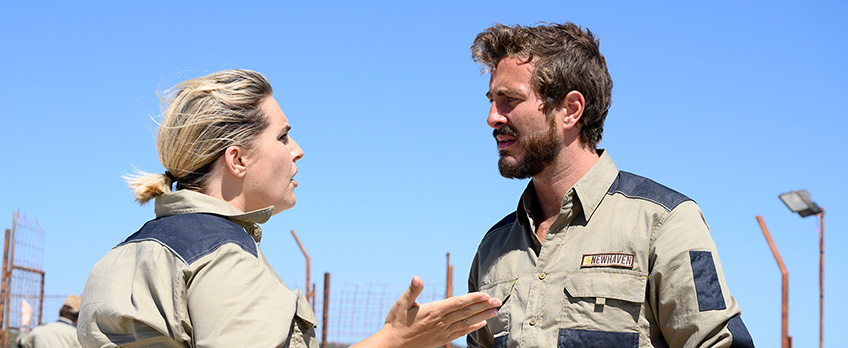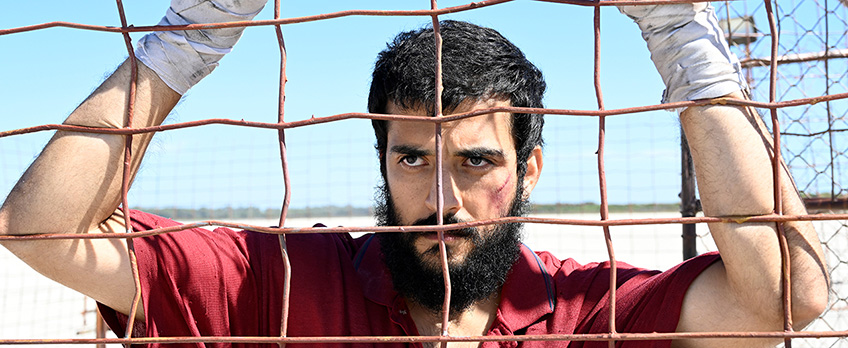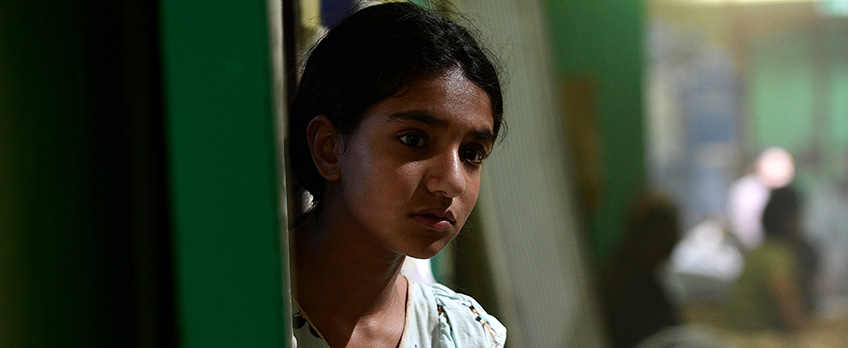Below – Q+A with director Maziar Lahooti

Starring Ryan Corr and Anthony LaPaglia, Below is a pitch-black comedy with a unique, and uniquely provocative, take on Australia’s controversial asylum-seeker detention system. We asked director Maziar Lahooti why he wanted to make this film, and how he hopes audiences will react.
Below is based on a stage play. How did you first experience the play and what about the subject matter drew you to want to direct a screen adaptation of the material?
When I was approached by producers Veronica Gleeson and Nick Batzias, they had already optioned the stage-play – which I never got a chance to see. I did however immediately find a copy of the script for the play online (as well as the scripts for all of Ian Wilding’s other plays I could find) and studied them in order to get a sense of Ian’s sensibilities.
The original play was set in a mining camp, whereas Veronica (I believe) had the idea of setting it in a detention center instead – this element is what first perked my interest, partly because my mother used to work in these prison camps as a language interpreter, and also we have had refugees on bridging visas live with us for years while they get settled, so the world and context was familiar.
But what ultimately drew me in and infused me with purpose, and determination to somehow persuade Veronica and Nick to give me a shot at directing it, was the opportunity for a heightened darkly comic tone, in the realm of Jungian symbolic metaphor, to be used as a sort of zeitgeist lens through which we could take a deep look into our soul as a nation and people, and to then relate that to the wider world.
The film dances a fine line between satire and hard-hitting truths about the global refugee crisis and the conditions in detention. How do you hope audiences will receive this stark juxtaposition?
With an open mind. We have been very conscious of not preaching to the choir with Below. Our aim is to make a movie for folk who want their movies to be movies – wildly entertaining and fun, and populated with compelling characters you want to hang out with, and relationships you care about. We’re not looking to change anyone’s voting habits (and I’m not certain there’s evidence that there would be much difference in outcome even if they did).
What we would hope would be for everyone to just take a closer look and consider the legacy of people, historically, who allowed what’s happening to happen – and, ultimately, these people are us: you, me and any tax-paying citizen of any nation that supports these deterrent-by-indefinite-detention prison systems. We want audiences to understand that, irrespective of rhetoric, we are all complicit.

A scene from Below
In addition to established acting talent like Anthony La Paglia and Ryan Corr, the film features a number of highly skilled newcomers. Can you tell us about the casting process?
I can’t speak highly enough of our casting team. It was a national search, where Alison Telford took the lead nationally and Megan Riley handled the Perth end. I also had help from Perth casting legend Annie Murtaugh-Monks. We did a ton of auditions, but it was a long road to get there since we first had to get a sense of the tone and, once we did, we had to find actors who could somehow ground their performances in the given circumstances of the story, whilst managing the heightened and comic aspects, without killing the audience suspension of disbelief.
It was incredibly challenging and I can only be grateful for the team around me who pushed me this way and that until we found the right people for each role. My own aim is usually to sync the person to the character, so I tend to give my actors relative freedom to find that. In essence, it was an exercise of balance – and it remained so the whole way through.
Ryan Corr’s character (Dougie) is an oxymoron. While he appears to be more emotionally attuned to the people in detention, he takes advantage of their plight for his own gain. What does he represent to you and how do you think audiences will engage with this character?
He represents me in many ways – and, since I don’t consider myself a unique snowflake by any means, I believe he represents us: privileged, good, moral and ethical people of the western world. I believe we are all driving ourselves mad in trying to reconcile our sum-total complicity in what’s happening with the fact that we are all good people who want to do right by others and help one another.
It is easy to justify whatever when we’re speaking in abstract political rhetoric and ethics (the old “push one person onto a train track to save five people the train will hit if you don’t” scenario), but ultimately, when we get down to the personal nitty gritty, very few of us want innocent people to suffer for crimes they are not responsible for. It doesn’t matter who you vote for.
Ultimately, Dougie is us and to me he represents what I believe to be true relative to most of these kinds of issues, in that what we have are not individual problems, so much as institutional ones. Dougie in many ways is like a contemporary court fool – and only the court fool gets to speak truth to the power of the king.

A scene from Below
The film is set in something of a dystopian future, though the context hits very close to home. What do you hope audiences will take away from Below?
Firstly, I hope they laugh, cry, and come away satisfied with the experience. In a more abstract sense, I would hope it might inspire philosophical and ethical questions on the greater issues the film relates to.
If there is one thing that became crystal clear to me having the privilege of growing-up influenced by three radically different cultures and people (Iranians, Norwegians and Australians) it is that, despite how evident our differences are, our similarities far outweigh them – and we are all just trying to do our best and we are all trying to be good.
I believe that good people do bad things, because they are desensitised or because they believe they are doing good, or they are manipulated, or whatever. I have been attempting to reconcile that paradox my whole life, so this film is probably part of that continued attempt – and I hope the audience comes away asking the same philosophical questions.